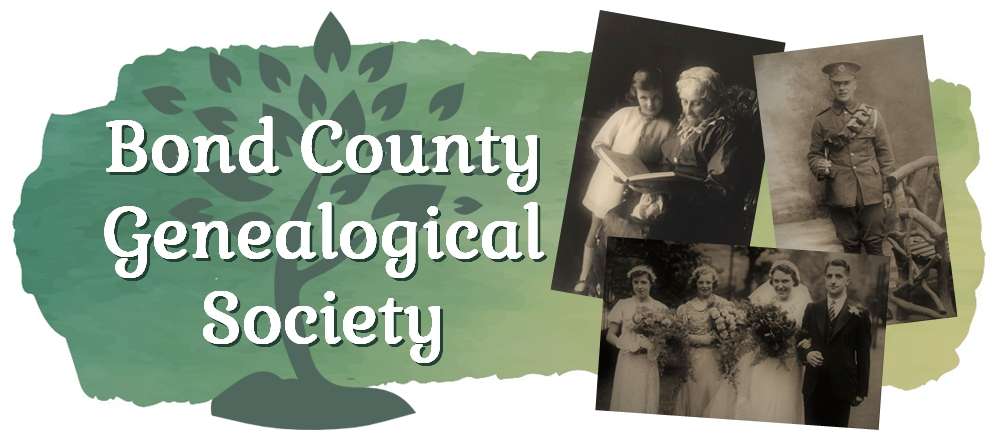A Genealogist’s Perspective: Documenting This COVID-19 Pandemic
Writings, timelines, journals; photos; drawings, paintings; short videos. Date everything! Use extra details!

Share Your Story: Southern Illinois in the COVID-19 Pandemic
We are living through an important moment in history, and we want to hear how it is affecting the people of Bond County, Illinois and immediate surrounding areas.
As COVID-19 changes life to a “new normal,” BCGS is asking you to share, in your own words, reflections of your experience during the pandemic, for the benefit of future generations.
Whether you are in quarantine, sheltering at home, working in the medical field, homeschooling your kids, or adjusting your business model for uncertain times, your story is unique and valuable.
These submissions will be collected into a digital archive. In the short-term, we will share some of these submissions on social media, our newsletter, and in online exhibitions.
In the long term, these submissions will be used to inform future generations about life in Illinois during the COVID pandemic.
We’re looking for things that speak to your life and your community during the COVID-19 pandemic.
Examples might include a letter written to a quarantined relative, a photo of yourself or your community, a sketch of a busy park or empty playground, a photo of a thermometer or test kit, a song you have written, etc.
We’re all in this together. Life has changed for everyone, and we’re all processing so many feelings.
Your contribution will help people understand the wide range of emotions and experiences brought about by COVID-19.
What Should People Collect and How They Should Collect It?
Please take the time each day to record your activities, thoughts, and/or feelings in diary form. The entries can be handwritten, typed, or in video format, and be as long or short as you want.
Don’t worry about handwriting, spelling, or punctuation. The goal is to capture your personal experiences.
Sometimes it can be difficult to get started on that diary, or to think of what you might include in that diary. So, below are some things to think about, with regards to current events, to help you get started:
- What did you do today (or this week)? How was that different than what you would do on a “normal” day/week?
- What changes have you personally experienced (physically, mentally, and/or emotionally) since this crisis began?
- What changes have you observed in your family, your friends, or your local community?
- Are you a student or a teacher? Where and how do you normally attend school? Has this changed? How’s that going? Or is there a student or teacher in your family? How is the crisis affecting their schooling situation?
- Do you typically work outside the home? What is your job normally like? What is it like right now? Are you still working, whether on-site or remotely? Why or why not? How’s that going?
- Are you practicing social distancing? Why or why not? What are you doing? How is this affecting your relationships? How do you stay in touch with family and friends?
- Has this crisis changed (whether voluntarily or involuntarily) any of your plans for day-to-day errands, travel, visiting, leisure activities, celebrations, religious activities, etc.?
- What do you think about the actions of government leaders in response to this crisis?
- What has been the most difficult thing for you personally about this crisis? Do you think there’s anything positive that may come from what’s happening?
A few more things to remember when journaling about the Coronavirus pandemic of 2020-2021 for future posterity:
- Use Dates When Journaling – Always top the page with a date and the day of the week. As the future reader turns the pages, they will be able to see the way in which things unfolded day-by-day. If you really wanted to get detailed, you could even put the time of day!
- Use Extra Details – This is probably the most important aspect of journaling.
- Journal Your Feelings – Are you worried? What exactly is worrying you? What miracles are happening around you? How do you feel about your preparation and the way others are preparing?
- Journal Details About Others – Not everyone is going to keep a journal or diary of this unique time in our history. Therefore, consider writing names of other persons in your writings.
- Collect News Articles – Even if you aren’t buying traditional newspapers, you can use the snipping tool or a screen capture app to get a few key articles from online newspapers and print them at home. Be sure to use reputable sources and record where the article came from and the date.
- Your History is Up to You – Your story will be different than mine and different than your neighbor’s. The only one that can write your story is you. Do not delay or put it off. Get started writing right now! Pull up Google Docs, open a note taking or audio recording app, or just pull out a piece of paper and start writing. I think you will glad you did and so will your posterity and the posterity of others.
Submit Your Story to BCGS
To submit a journal—full or sample portion—please use our web contact form, email address (to include attachments), P.O. Box, or bring materials to a meeting. Entries may be submitted anonymously. Contact BCGS if you have any questions or problems sending submissions.
